By Stephanie Kripa Cooper-Lewter
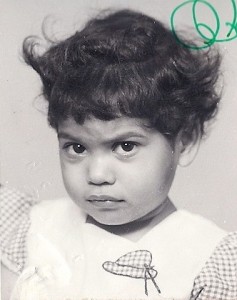
Kripa as a young child
Photo Credit: Kripa Cooper-Lewter
I often prayed to God as a young girl that I would someday return to my first orphanage and find my Indian mother. Many evenings I looked up at the stars with the moon shining brilliantly, wondering if on the other side of the world my Indian mother ever noticed the same beautiful night sky and thought about the baby girl that was once lulled to sleep by the sound of her heartbeat years ago.
I’m unsure of the date or my age when I was placed in a cradle at the Shishu Bhawan Missionaries of Charity Kanpur orphanage run by Mother Teresa. Perhaps my Indian mother brought me there. My adoption paperwork states I was abandoned by unknown parents, making the circumstances surrounding my abandonment and early life a mystery. The Catholic Indian Sisters at the orphanage gave me a name, a birthday and a new identity.
I became Kripa and based on my physical size, they estimated my birth year to be 1972. Hand written notes state I may have been Hindu and perhaps Punjabi. I was transferred in February of 1975 to the Sister’s Delhi orphanage and then moved to a Catholic Indian foster home before I became an adoptee. An American, white, single woman adopted me from India in June of 1975.
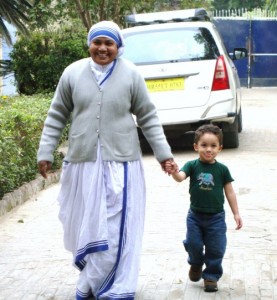
Photo Credit: Kripa Coope-Lewter
Family provides connection and context for who we are, where we belong and why we are here. My beginning story is not unique.
Ninety percent of abandoned children in India are girls. An orphan in Indian society is the lowest status a child can have. India doesn’t always value her daughters, especially the unwanted, forgotten lost girls without family lineage that can be traced.
I have always been a seeker, yearning to fill in the blank pages of my beginning story before I arrived at my Indian orphanage. So I set out on a pilgrimage nearly 35 years later to retrace the steps my baby feet once walked in India. I traveled with my husband, our teenage daughter and our son who was exactly the same age I had been when I left India in 1975.
My children are my greatest gifts, the only genetic and biological links in this world I can hold. That’s why I wanted my first trip back to my country of origin to include my family so they could see the India I loved and once knew.
My heart pounded with anxiety as I approached the doorsteps of my Kanpur orphanage, the place where my written story begins as the Sisters documented my presence in this world. Greeted warmly by the Sisters, it felt as if time stood still inside the orphanage with its dull-colored walls and rows of cribs.
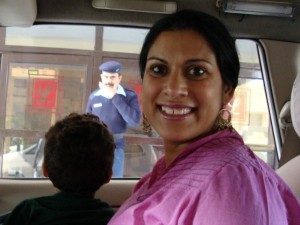
Kripa leaving Kanpur hotel on way to the Kanpur orphanage
Photo: Kripa Cooper-Leweter
From newborn infants to plump toddlers, the children brightened the dimly lit rooms with their personalities and vibrant assortment of clothes. I saw myself in each of the girls I held. Their beautiful dark eyes searched mine for answers; some bright with hope and resilience, others subdued by sadness. Families can be broken for so many reasons, if only they could share what their little hearts had already experienced. I wished I could see each of their destinies and promise them a future filled with love and belonging.
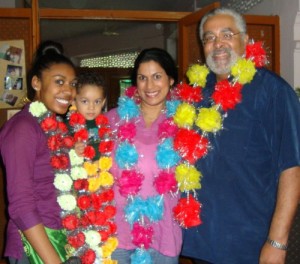
Kripa & her husband and children at the Kanpur orphanage.
Photo Credit: Kripa Lewter-Cooper
It was priceless to see with my eyes and feel with my heart my Kanpur orphanage. The Sisters there showered our family with love as we visited even though none of them had lived here in the 1970’s nor were they sure if there was additional information from old records about me to share. I had hoped by returning to my orphanage I would discover more about my Indian mother’s triumphs, struggles, joys and fears. I wanted her to know she no longer had to wonder about my fate; I survived, my life was different and beautiful, despite heartache and loss.
Tears streamed down my cheeks when I said goodbye at my Kanpur orphanage. Being back in India was the closest I had been to my Indian mother since our first goodbye years ago – she was so close, yet still beyond my reach.
Do you know my Indian mother?
Maybe she is your older neighbour who has carried too long the burden of a deeply held secret of a child she once birthed into this world and then let go. Perhaps shaped by the culture around her, she didn’t see added value in raising a girl. Maybe she loved someone and became pregnant before being married only to face stigma, shame and judgment alone. Perhaps she was a victim of rape or incest and a baby was the unintended consequence placing her life at great risk.
Maybe she had an arranged marriage and felt pressure to get rid of a girl when her family prayed for a boy. Perhaps she was divorced or widowed and uncertain of what the future would hold with a child to raise all on her own. Maybe she was wealthy and educated, and believed it wasn’t the right time to commit to parenting a girl. Perhaps she lived on the streets and someone else decided she wasn’t worthy to be a mother and took her baby girl.
Do you know my Indian mother?
Today, my Indian mother would be in her 50’s or older, effortlessly wearing saris with grace and ease. Her once youthful look may have aged. Her hair is probably streaked with gray. She may have wrinkles around the corners of her eyes when she smiles. Perhaps some of the lines on her face were created from worry and sorrow. Maybe she has family and grandchildren that fill her days with happiness. Most of all, I hope she has loved with all her heart on the journey and felt love in return.
Do you know my Indian mother?
Please help me find her.
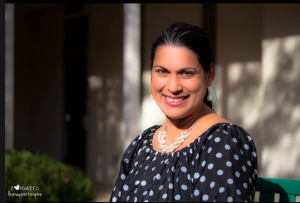 Stephanie Kripa Cooper-Lewter, Ph.D., M.S.W. is an Indian-American social worker, author and life coach. Her career focuses on supporting children and families. She speaks on child welfare and women’s issues for a range of audiences. She created the Indian Mom’s Circle of South Carolina to connect Indian mothers together. She is also Co-Founder of Lost Sarees, an organization uniting Indian adoptees and building bridges to the South Asian community, www.facebook.com/Lost.Sarees. Kripa can be reached directly at: www.facebook.com/StephanieKripaCooperLewterPhD.
Stephanie Kripa Cooper-Lewter, Ph.D., M.S.W. is an Indian-American social worker, author and life coach. Her career focuses on supporting children and families. She speaks on child welfare and women’s issues for a range of audiences. She created the Indian Mom’s Circle of South Carolina to connect Indian mothers together. She is also Co-Founder of Lost Sarees, an organization uniting Indian adoptees and building bridges to the South Asian community, www.facebook.com/Lost.Sarees. Kripa can be reached directly at: www.facebook.com/StephanieKripaCooperLewterPhD.
©masalamommas and masalamommas.com, 2016-2017. Unauthorized use and/or duplication of this material without express and written permission from this site’s author and/or owner is strictly prohibited. Links may be used, provided that full and clear credit is given to masalamommas.com and Masalamommas online magazine with appropriate and specific direction to the original content.


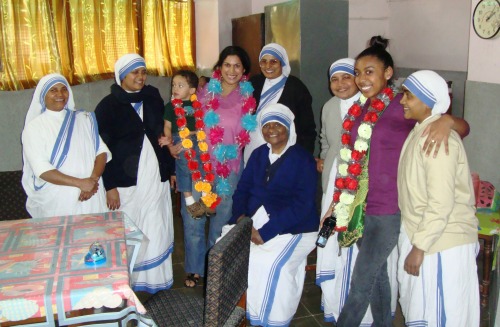
What a powerful story! Have you tried DNA? Many adoptees who are abandoned (and called Foundlings) have found some relatives (who have also dna tested which in some cases has led them closer to their biological parents. It is indeed worth a try. We recommend dna.ancestry.com which will give you your ancestral history and the names of relatives who have tested ( both close and distant). Please join DNA Detectives on fb for a link to the sale and to learn more about how dna is helping adoptees. You are an amazing individual. Good luck in your journey.
DNA is a good option to give some insights to origins. Also may help to bear in mind that the year of birth 1972, is a time when many babies were taken in by Mother Teresa’s sisters of charity and adopted out of Bangladesh (East Pakistan) following the war. Many were then adopted into families in North America, Canada, Netherlands etc. Worth looking into